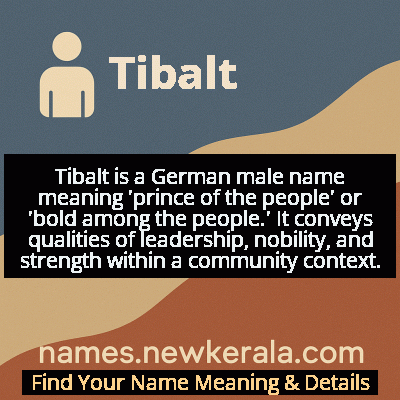Tibalt Name Meaning & Details
Origin, Popularity, Numerology Analysis & Name Meaning of Tibalt
Discover the origin, meaning, and cultural significance of the name TIBALT. Delve into its historical roots and explore the lasting impact it has had on communities and traditions.
Name
Tibalt
Gender
Male
Origin
German
Lucky Number
1
Meaning of the Name - Tibalt
Tibalt is a German male name meaning 'prince of the people' or 'bold among the people.' It conveys qualities of leadership, nobility, and strength within a community context.
Tibalt - Complete Numerology Analysis
Your Numerology Number
Based on Pythagorean Numerology System
Ruling Planet
Sun
Positive Nature
Leaders, ambitious, highly driven, self-reliant, innovative.
Negative Traits
Overly aggressive, domineering, impatient, selfish.
Lucky Colours
Red, orange, gold.
Lucky Days
Sunday.
Lucky Stones
Ruby, garnet.
Harmony Numbers
2, 3, 9.
Best Suited Professions
Entrepreneurs, managers, engineers.
What People Like About You
Courage, determination, leadership.
Famous People Named Tibalt
Tibalt von Toggenburg
Swiss nobleman
Prominent medieval Swiss noble from the House of Toggenburg
Tibalt de Champagne
French noble and poet
Count of Champagne and King of Navarre, renowned trouvère poet
Tibalt von Zähringen
German noble
Member of the Zähringen dynasty in medieval Germany and Switzerland
Tibalt Merz
Swiss musician
Contemporary composer blending traditional European folk with modern elements
Name Variations & International Equivalents
Click on blue names to explore their detailed meanings. Gray names with will be available soon.
Cultural & Historical Significance
In literary tradition, Tibalt appears in Shakespeare's 'Romeo and Juliet' as Tybalt, though this characterization differs from the historical nobility associated with the name. The name carries echoes of medieval chivalry, aristocratic heritage, and the complex social structures of feudal Europe, representing a bridge between Germanic tribal traditions and the emerging courtly cultures of medieval kingdoms. Throughout history, the name has maintained its association with leadership and nobility, often chosen by families wishing to emphasize their historical connections or aspirations toward leadership qualities.
Extended Personality Analysis
Individuals named Tibalt are often perceived as possessing a natural leadership quality combined with strategic thinking. They tend to exhibit confidence and determination, characteristics that align with the name's meaning of 'prince of the people.' There's often an air of nobility and self-assurance about them, whether in personal or professional settings. They typically demonstrate strong decision-making abilities and are not afraid to take charge when situations demand leadership.
At the same time, Tibalts often possess a keen sense of justice and fairness, showing concern for the well-being of those around them. They may display a blend of traditional values and innovative thinking, making them effective in roles that require both respect for established systems and the vision to improve them. Their personality often includes a diplomatic streak, enabling them to navigate complex social situations with grace and tact, while their inherent boldness ensures they don't shy away from necessary confrontations. This combination of traits often makes them respected figures in their communities or professional circles.
Modern Usage & Popularity
In contemporary times, Tibalt remains a relatively rare but distinguished choice, primarily found in German-speaking countries and among families with strong connections to medieval history or aristocratic heritage. The name has experienced a modest revival in recent years as part of the broader trend toward historical and unique names, though it hasn't reached mainstream popularity charts. It's particularly favored by parents seeking a name with historical depth and noble connotations without being overly common. In German-speaking regions, it's occasionally used as an alternative to the more common Theobald, offering a slightly more streamlined and modern feel while maintaining its traditional roots. The name's usage is often intentional, chosen by parents who appreciate its aristocratic heritage and the strong, leadership-oriented qualities it represents.
Symbolic & Spiritual Meanings
Symbolically, Tibalt represents leadership, nobility, and the connection between individual strength and community welfare. The name embodies the concept of the 'first among equals' – someone who leads not through domination but through earned respect and natural authority. It carries connotations of protection and responsibility, suggesting someone who bears the weight of leadership with grace and determination. The symbolic meaning extends to concepts of heritage and tradition, representing continuity between past and present. In a metaphorical sense, Tibalt symbolizes the bridge between individual ambition and collective good, between personal courage and social responsibility. The name also carries undertones of medieval chivalry and honor, suggesting someone who operates according to a personal code of ethics and maintains dignity even in challenging circumstances.

